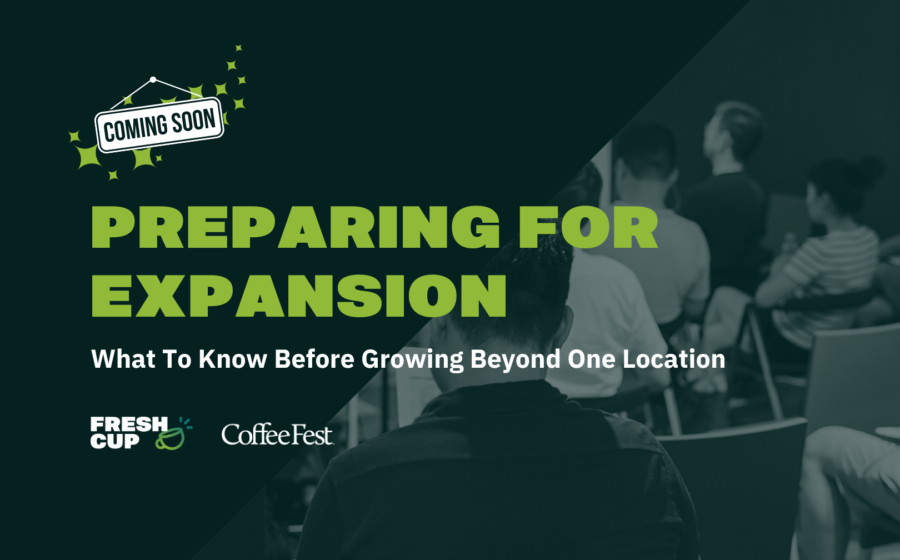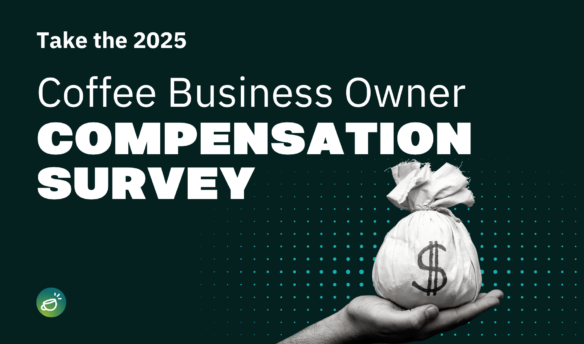In March of 2023, I led three different panel discussions at Coffee Fest in New York, inviting speakers across the coffee sector to speak on specific matters that’ll hugely impact the future of coffee. Each panel covered an idea our contributors have pursued passionately on our website—like automation or how to spend your marketing dollars.
Perhaps the panel I was the most excited about had to do with an essential question: when is the right time to expand? We asked fundamental questions like:
- Is there a right time to expand? Is there a measure or metric that can help business owners determine when to consider a second location?
- If you’re happy with one location, should you even expand?
- What opportunities can opening multiple locations unlock?
- And what are the tools you need to make expansion possible?
Panelists include:
Dave Delchamps, Customer Success Manager at Bellwether Coffee
Delchamps has been a part of the specialty coffee industry for 15+ years. He’s launched retail stores and worked as a staff trainer, coffee roaster, and lab manager. A passion for training and equipping coffee business leaders led Delchamps to business development and customer success. He helps cafe and retail brands across the US expand and elevate their business models.
Brian Helfrich, CEO of Summit Coffee
Summit Coffee is a roaster-retailer with 10+ cafés in the Southeast and wholesale relationships across the US. For 12 years, Helfrich has led Summit’s growth from a single shop in Davidson, North Carolina, and the company is now in its most significant growth phase in history as it quickly expands its retail footprint.
Nigel Price, Founder of drip coffee makers
In 2018, Price began hosting pop-ups across Brooklyn and Manhattan as a coffee cart. In January 2020, drip coffee makers opened its first brick-and-mortar location; three years later, there are four locations throughout New York City.
Here are key insights from our discussion:
Identify Your Motive For Growing
If you want to expand, our panelists believe you should have a good reason. “I think the most important thing is to understand what you’re hoping to get out of opening a second store, third store, tenth store…” says Helfrich. “What is your motive for growing? Is it to make as much revenue as possible? If that’s it, that’s fine. For us, it was about creating more jobs in our community.”
If you don’t think your second location can achieve the same quality standard as the first, rethink your expansion plans. “If you open a second shop, you have to be able to say, ‘I think I can do this as well as I did it the last time.'” says Helfrich. “We’re not willing to sacrifice our brand just to scale. It was important for us to say, ‘Can we do this just as well?'”
Setting goals also means you’re less likely to say yes to a lousy opportunity: Helfrich notes that people will approach you with ideas for expansion, but you shouldn’t say yes to every prospect. “It becomes a romantic thing where everyone’s pursuing you, and you want to say yes to every opportunity—be diligent in assessing these opportunities. We’ve taken some locations we didn’t vet as thoughtfully as we should have.”
If you open a second shop, you have to be able to say, ‘I think I can do this as well as I did it the last time.’ Brian Helfrich, CEO of summit coffee
Along with being judicious about expansion opportunities, Helfrich says you have to be picky about what you do within your cafe—you don’t have to do things just because they’re successful for others. “Early on, we were trying to say yes to all these ideas: we wanted to do food, we wanted to do beer and wine—the reality is knowing what you’re good at, what you’re passionate about, and know what you’re not good at and what you’re not passionate about,” says Helfrich.
He continues, urging people to learn from his mistakes: “We did food for a long time, and I have no interest in being in the food business, which was reflected in our service. You don’t need to do everything, especially because everyone around you is doing it. Try to be true to who you are and what’s passionate about, and hopefully, that’s good enough to make a business that stands on its own two feet.”
Price similarly eliminated food from his menu, focusing solely on coffee, but notes that this might not work for others: “I think to get people in your shop and sitting, you’d need to offer some kind of food. But it didn’t make sense for us, and I didn’t want to force it.” Because drip is so strongly rooted in coffee, he strengthened his brand by narrowing the focus.
Summit Coffee operates on a franchisee model: Helfrich says that means they must surrender some control but that you must identify what is vital to the brand’s identity and hold to that. “For us, it’s our design and our coffee quality.” Delchamps affirms that you can’t focus on everything, so you have to be picky about what elements make your brand stand out. “Pick a couple of details that you think embody your brand, and focus on that and make that special and stand out for your customers rather than trying to do everything to the highest level of detail.”
Foster A Positive Workplace With Clear Expectations
Expansion means delegating, our panelists note. You can’t be in two places at once: “It’s imperative that you understand if you’re doubling your workforce … you need people that will represent you at the second store just as well when you’re not there. And ultimately, that comes with a good culture and being able to take care of your staff,” says Helfrich.
Expanding means hiring new employees, but, as Delchamps points out, “unless you’re willing to really invest in those people, you’re just not going to get the most out of an expansion plan.” Delchamps notes that people set the culture, so investing in training is vital to establishing a positive culture that carries through all your locations.
When it came to the fourth location, the space was already built out, and the building managers were looking for an operator that they could trust and would keep the value of the building high, so they reached out to me with super favorable terms. There’s no way I would have expanded without favorable terms. I’m not going to pay $8,000, $10,000 a month in rent. nigel price, drip coffee makers
You’ve probably heard someone reference how hard it is to hire now, but our panelists note that they’ve witnessed shops retain employees and expand successfully. The secret? Thoughtful hiring, an involved onboarding process, and high-paying positions with generous benefits. “Ultimately, if you pay people well and offer benefits, that is fundamental to showing people that you care,” says Helfrich.
Get Specific With Money
You need no set amount of money to launch a second or subsequent location. Still, your existing locations should be profitable enough to stand independently and offer a blueprint for profit margins for future sites. “We have revenue and net income targets at all of our cafes,” says Helfrich. “We try to hit 15% net income at all of our cafes; that’s not necessarily the prerequisite to start opening more cafes. We try to hit that percentage within the first six to 12 months. If we can do that, we have a model that will start scaling from there.”
Price opened the first drip location in 2020 and, through the first store’s reputation, has gotten offers to expand that are financially sensible for him—and knows what business deals are valuable versus which would be too costly.
“When it came to the fourth location, the space was already built out, and the building managers were looking for an operator that they could trust and would keep the value of the building high, so they reached out to me with super favorable terms,” he says. “There’s no way I would have expanded without favorable terms. I’m not going to pay $8,000, $10,000 a month in rent.”
Money was a very real consideration for Helfrich when he decided to pursue a franchise model for Summit. “We sat down at the end of 2019—we had three stores and our roastery. We talked about how we wanted to scale up and determined that our best customers are our own cafes,” he says. “One of the benefits of franchising is that you’ve already done a ton of work on the front end; you’ve built the playbook and operational systems. And then you bring people in very carefully who put up the financing for their own stores.” Summit helps franchisees with site selection and operations but allows owners to design stores to reflect their tastes and neighborhood needs.
Before you even think about a new location, Delchamps says you should understand your profit and losses (often called a P&L sheet). “The P&L is super important when it comes to scaling because it’s really easy to open a super cost inefficient business.” Helfrich breaks it down like this: 60% or less of your costs should go to labor and cost of goods, and if you aim for 15% profit, the other 25% should account for operating costs. Rent will likely be your highest operating cost, and Helfrich advises if your rent is 10% of revenue, it could be challenging to hit that 15%. “If rent is going to be $4,000 a month and we can’t do $40,000 a month in revenue, then we don’t think that’s a model that will work.”
Delegate And Standardize
As mentioned above, if you plan to expand, you must recognize you can’t be in charge of everything because you can’t be in multiple places simultaneously. “I have people who are just as skilled and have better palates than I do,” says Price, who used to go to each of his shop locations and dial in coffee recipes every night until he delegated the task to his staff.
Delegating a task doesn’t mean you’re not invested in it. Delegating a critical business component to an employee is a way to build trust and allow someone to focus their energy on ensuring success. “We have a coffee quality coordinator—we’re fortunate enough where we can delegate it, where somebody can make it their core focus,” says Helfrich.
Pick a couple of details that you think embody your brand, and focus on that and make that special and stand out for your customers rather than trying to do everything to the highest level of detail. Dave Delchamps, Customer Success Manager at bellwether coffee
The benefit of delegating big tasks, like maintaining coffee quality, is that it can help create replicable systems—if you’re managing quality across stores, for example, you might be doing it on the fly while juggling a thousand other tasks. Delegating tasks to an external team allows you to create systems to standardize processes that you deem valuable to your brand. “Anything that you want to be consistent and repeatable, you need to have a process that makes it consistent, repeatable, and simple for your staff to adhere to,” says Delchamps.
At Summit, each location has a refractometer so baristas can measure extraction and use numbers to quantify their brewing parameters and calibrate across stores. “The refractometer has given us a good touch point,” says Helfrick. “And then it’s also a system of accountability—the managers report numbers weekly. They are calibrating their grinders, making sure their batch brew is dialed in, etc..”
There were a lot of amazing tips from this panel, and we didn’t want to omit any because they didn’t fit into their own category, so here’s a list of quick insights from our panelists:
- Don’t be afraid to negotiate with your partners. Price operates a multi-roaster brand and noticed that people came to his shop to seek out new and exciting coffee brands. Helfrich suggests having a conversation with your roaster to negotiate price and terms—the worst they can do is say no!
- Helfrich says, “the jump from first to the second location is the hardest.” After that, opening subsequent stores gets easier.
- If you’re considering adding food, note that food sales can drive up average ticket prices, but you risk wasting product and items going bad. Delchamps suggest determining what you’d like your average ticket sales to be and working backward from there.
- There’s a lot of work involved in expanding, but there’s also a little bit of luck involved—don’t be afraid to pursue unconventional routes.
- Access to capital has changed significantly over the last two years: borrowing money has become more difficult. If you want to tap your personal network for investment, make sure they understand and support your vision.
















